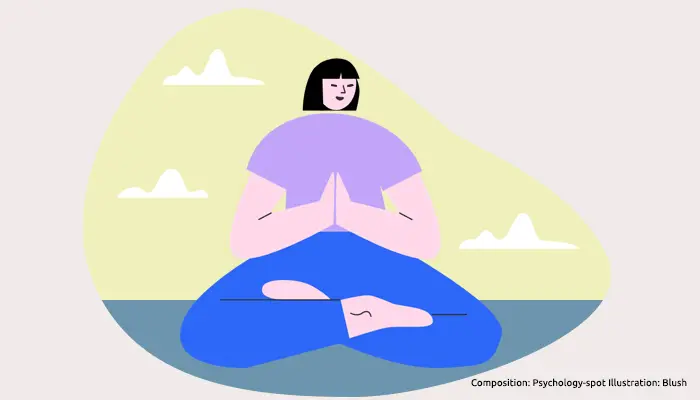
“Use pain as a steping stone, not a camp ground”, said Alan Cohen, referring to those moments when we decide remain comfortably in the shadow of pain.
We can learn to relate to pain and suffering as we would with a stone encountered on our way. We can’t deny its existence and will probably become an obstacle that bothers us, but the wisest thing to do is find out how to leave it behind.
The Mustard Seed: The Buddhist parable that shows us how to assume suffering
“A long time ago, a young woman lost her young son. The pain and suffering were so great that she wandered through the streets, begging for a magic medicine that could bring back his life. Some looked at her with pity, others teased her and called her “crazy”.
A wise man, seeing her desperation, said:
– There is only one person in the world who can do the miracle. He lives on top of the mountain. Go and ask him.
The woman went up to the mountain and prayed:
– Oh Buddha, return the life to my son.
Buddha said to her:
– Go back to town and go door to door. Bring me a mustard seed from a house where nobody died.
The woman’s heart recovered hopes as she rushed from the mountain to the city. In the first house she said:
– Buddha asked me to take a mustard seed from a house where no one died.
– Many died in this house -, they replied.
So the woman went to the next but received the same answer. The same happened in the third house, the fourth, the fifth, and so on throughout the whole city. She could not find a single house that had not been visited by death.
So the woman returned to the mountain.
– Did you bring the mustard seed? – asked Buddha.
– No, I’m not looking for it anymore. I begin to understand what you wanted to teach me. Blinded with pain, I thought I was the only one who suffered.
– So why did you come back? –
– To ask you to teach me the truth.
To which Buddha replied:
– If you want to know the truth about life and death, you have to understand that in the universe there is only one law that is not subject to change: All things change and nothing is permanent”.
This parable teaches us that pain and suffering are part of life, it makes no sense to try to escape them, but it does not even make sense to prolong them infinitely by clinging to recurrent negative thoughts that only make worse suffering.
Why are we stuck in suffering?
When adversity knocks on our door, it’s hard to recover from the hard hit. Sometimes we are taken by surprise, sometimes it’s so strong that we lose our psychological points of reference.
Recovery is not easy and everyone needs a period of time. In fact, we do not need the same rate for recovery, because we do not attribute the same emotional meaning to situations and we do not have the same coping resources. However, we must make sure that we do not remain stuck in suffering, we must not stick to that “stone” turning it into the area where we camp.
One of the main reasons why we get stuck in suffering is that we refuse to accept what happened. We know that when we leave behind that suffering we will be able to turn the pages. And sometimes we do not want to turn the pages because we think it would mean forgetting the person who no longer is with us or assuming that we can do nothing more to remedy a situation where we do not feel comfortable.
It’s a paradox blockade because we do not want to feel bad, but we do not even want to feel good because in our mind it would mean leaving behind a part of life with which we still identify.
In some cases this paradox can be caused by guilt. That is, we can not forgive what we have done or stopped doing, and we punish ourselves through that pain. In this way, suffering becomes a way to blame ourselves.
Unfortunately, we may feel guilty without being fully aware of it, so we allow the guilt to become a chronic condition affecting our ability to recover.
3 ideas you have to accept to overcome pain and suffering
To leave behind the suffering it is important to understand that our instinct pushes us to fight pain. It is usually a protective instinct, but in some cases, especially when it comes to psychological pain, it is transformed into suffering and becomes counterproductive.
To overcome this emotional blockade we have to assume these three concepts:
1. Denying what happened will not make the problem disappear. Keeping yourself in the denial phase, hoping that what has happened has only been a bad dream, will not solve the problem and will not make you less unhappy, on the contrary, will only serve to aggravate suffering. On the other hand, practicing radical acceptance can help.
2. Turning page does not mean forget. Continuing with your life does not mean that you will forget, or that the event or the person will be less significant to you, simply means that you have adapted to the new circumstances and become a more resilient person. No more or less.
3. Suffering does not eliminate guilt. Suffering does not eliminate guilt and does not assure you the pardon. What really lets you go on is learning the lesson. And you only learn the lesson when you get matures, which means that you keep yourself proceeding on your way.
Remember that there is a point where, after tears and sadness, it is essential to repair the broken pieces and move forward or you risk remainig trapped in depression.



